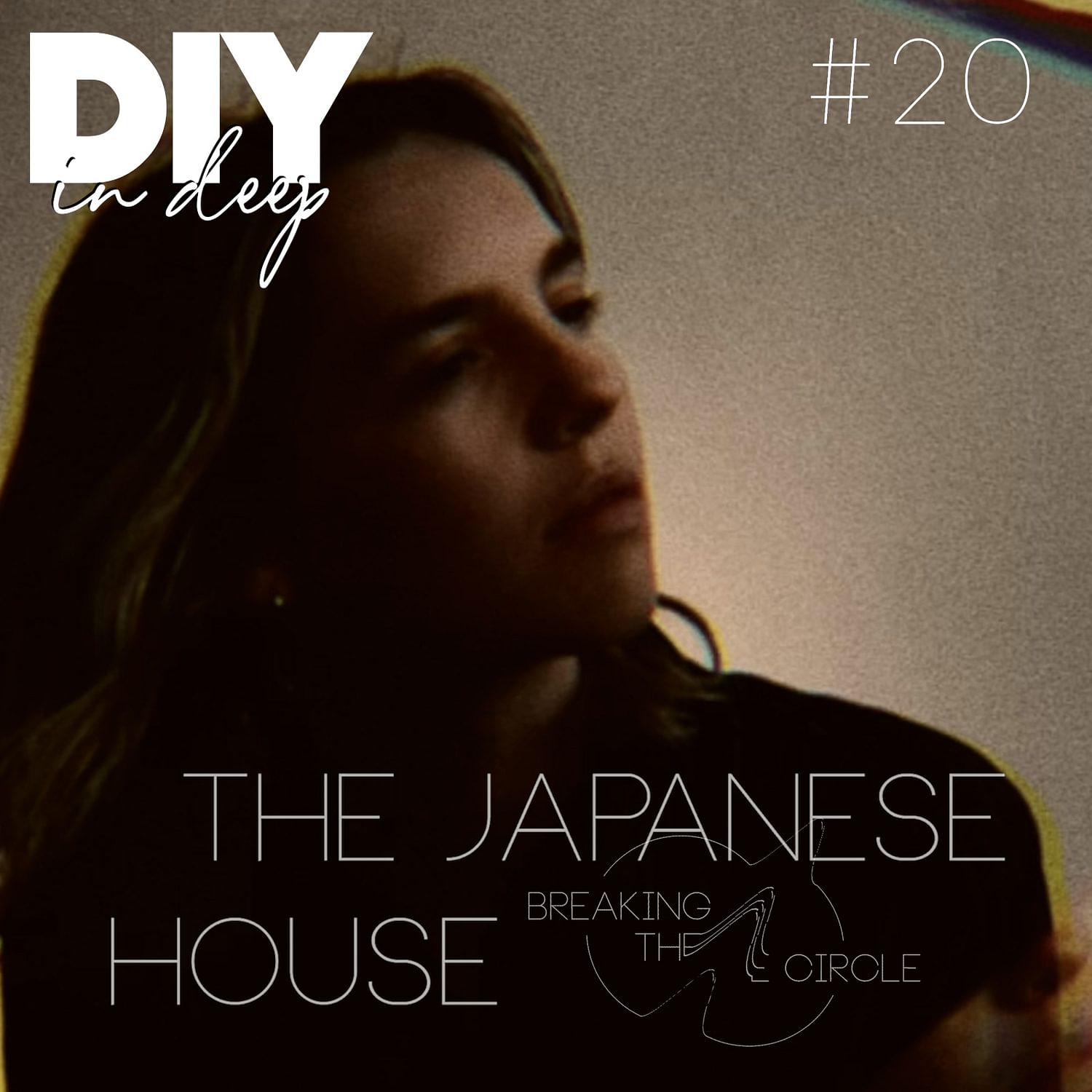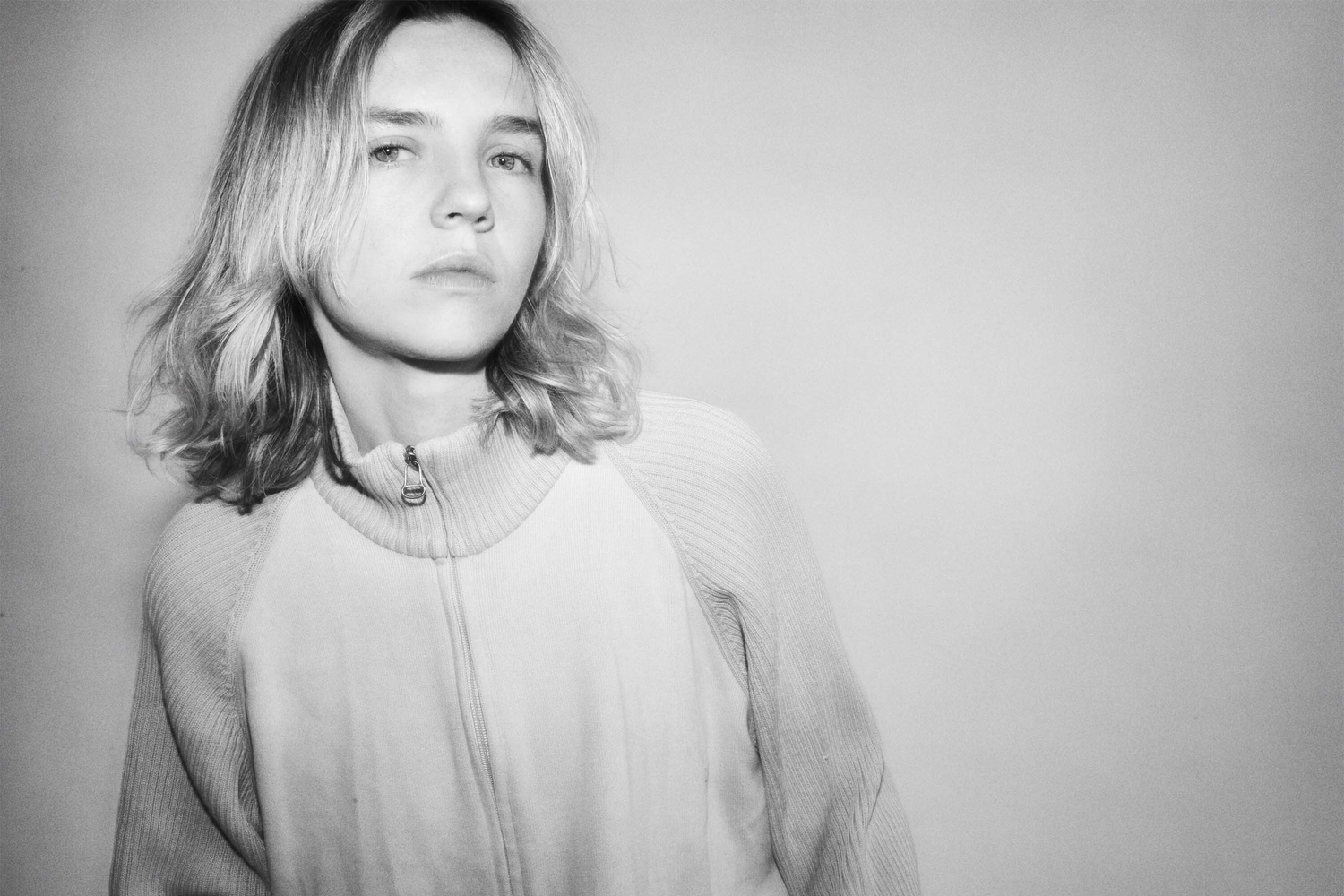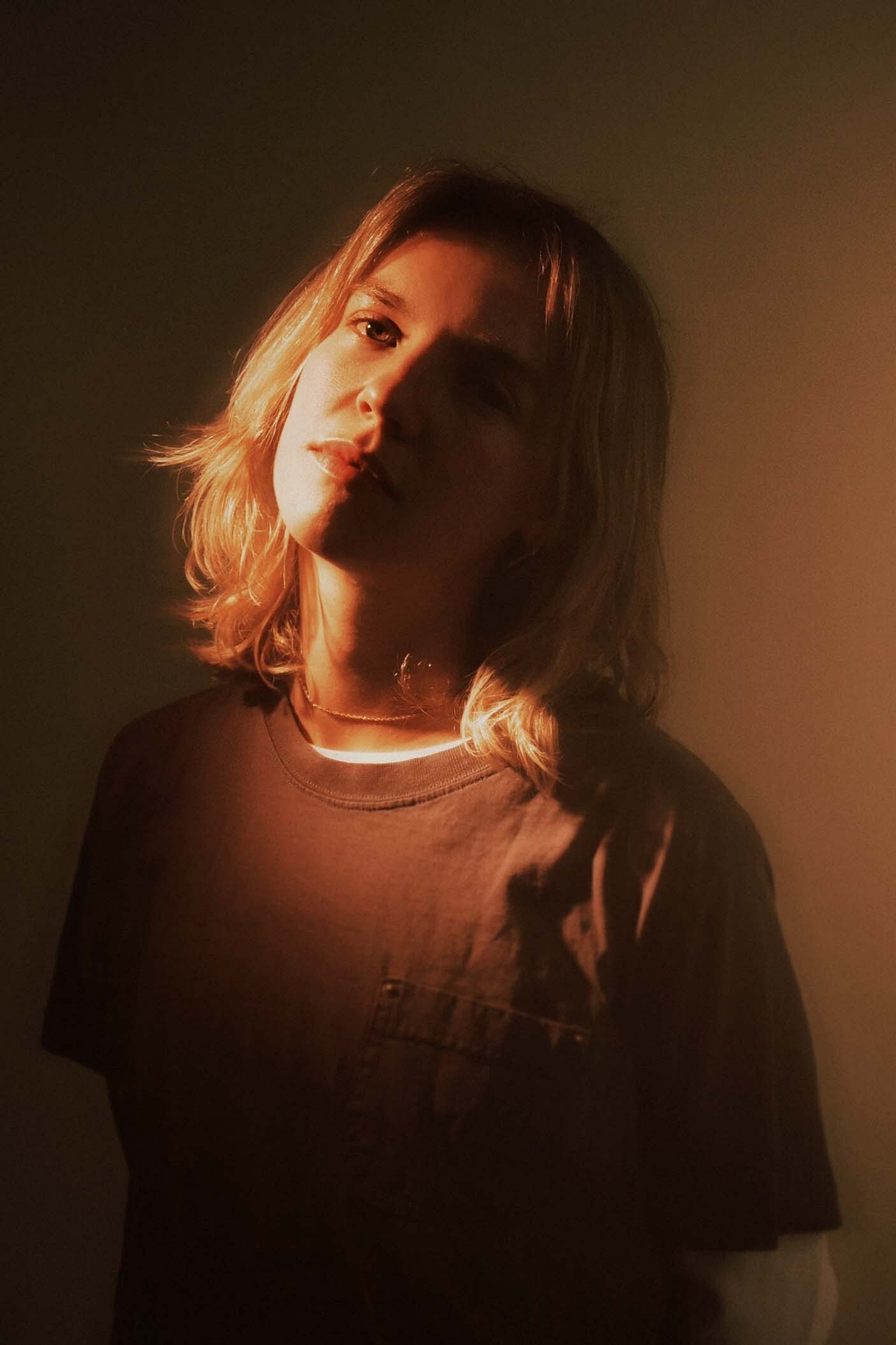
The Japanese House: Breaking the Circle
Returning with second album ‘In The End It Always Does’, The Japanese House’s Amber Bain is forging a new future based in confidence and self-exploration.

When a romance comes to an end, it’s often tempting to ponder the cyclical nature of things; to try and pinpoint the exact moment where old habits started to repeat themselves. When you’re a musician, though, it’s even easier to dwell on the ‘what if’s’ and to think about what you might lose - or gain - from the creative stimulation of heartbreak.
On the eve of her second record ‘In The End It Always Does’, Amber Bain - otherwise known as The Japanese House - is considering her process, positioning herself within the hand-drawn, infinite circle that adorns her album’s artwork. “Both times I’ve finished an album, I’ve been at the end of a relationship,” she says, calling in over Zoom. “It just makes you wonder: is this just what I do, or is it completely random timing? Would I even be able to finish a record if I wasn’t at the end of the relationship?”
Her camera isn’t on - a move you might initially interpret as symbolic of the mystery that made Bain’s early name. But as she quickly explains, she’s not trying to be distant. She’s actually just preserving her internet connection as she roams around Chicago, keeping up a running commentary of every cute dog she sees on her walk. It’s an intimate conversation, and yet innocuously so; much as with her music, Amber is happy to talk with sociable specificity, a far cry from the reluctant popstar that she’s often been painted as.
“Being quite androgynous-sounding just gave the impression that I was this mysterious loner sequestering in my bedroom,” she laughs. “But I’ve never been an introvert. It’s funny, because if you see a painting or read some poetry, you can appreciate that without the context of the creator. But with music, it seems really important that people know basically everything about you, and some people are still confused. I will often see comments on my music videos like, ‘Is this a girl or a boy?’” Her shrug is nearly audible. “I mean, you tell me…”
Certainly, the early ambiguity of The Japanese House played a massive part in Bain’s breakthrough, with endless rumours swirling as to who and where this celestial indie-pop could be coming from. At first, listeners thought that it might be a side project of The 1975’s Matty Healy. When it turned out that the haunting, multi-layered vocals were actually the work of a 21-year-old blonde from Hertfordshire, the blogosphere went wild, leading to a Dirty Hit signing and a close-knit production relationship with Healy and fellow ‘75 member, George Daniel.
Looking back on her origins now, Amber describes her signature autotuned ethereality as something of a happy accident. “When I’m in the initial stages of writing, I like to get things down quickly, so I’d just sing something and be like cool, whack autotune on it for now while I work it out,” she explains. “But then I realised that the only other person that people could compare me to was Imogen Heap, repeatedly. So I thought, well, this must be kind of original.”
Though she’s proud of what she achieved on her early EPs and 2019 full-length debut ‘Good At Falling’, Bain had long been feeling a creeping desire to do things differently, to “leave that specific electronic synthy thing behind”. “Maybe it’s just getting older, but now I’m much more about the message, or some really intricate instrumentation. I’m enjoying the performance side of the production now, rather than just a quick vibe.”
Long-term fans needn’t worry themselves about radical reinvention though; she’s keen to state that the change on her new record isn’t “crazily different”, just a case of learning to be more upfront. “Both in my vocals, and in the fact that the lyrics are pretty on the nose,” she elaborates. “It’s probably why I find it hard to listen to my old stuff sometimes, because I can hear that I’m shying away a bit, not being completely honest lyrically, or barely hearing what I’m singing. I just feel a lot more confident now. And I think I like myself more. Which never hurts!”


Liking oneself isn’t always easy to achieve in the tumultuous years of your early-to-mid twenties, but from the moment you hit play on ‘Spot Dog’ (a chaotic reimagination of one of Bain’s exes’ favourite songs, the 101 Dalmatians theme), the new-found conviction of The Japanese House is truly striking. It’s not just in the clarity of Bain’s vocal, either; where the melodies of ‘Good At Falling’ often felt like meditative lullaby, its follow-up has a brightness and detail that boldly fills what might once have been left as liminal space. Any Imogen Heap comparisons should shortly be put to bed — if anything, this record feels closer to Caroline Polachek via flickers of Phoebe Bridgers, MUNA, The 1975 and even Haim, finding an infectious balance between melancholy and optimism.
‘Sad to Breathe’, the lead single, breaks its heart over an exhilarating indie-pop BPM, while even tragic album closer ‘One For Sorrow, Two For Joni Jones’ resigns itself to the peace of romantic solitude, embracing the company of Bain’s pet dachshund: “Sometimes I think without you / Life would lose its bones / But really, day to day, I’ll still just be walking in the park with my little Joni Jones”. “My other dog Calvin probably thinks I’m being a traitor,” she says. “But that’s another thing that happened; Calvin now spends most of his time with my dad, because him and my ex's dog didn't get on. He’s living his dream life now, but it does make me sad. Sometimes things just don't work out.”
As Calvin’s rehoming suggests, the last few years of Bain’s life have thrown up some notable challenges. Moving to Margate to be with her partner during the pandemic, she found it difficult to get stuck into writing new music, feeling frozen between two lives. “There's the initial high of, 'Oh my god, I'm not paying £3,000 a day to live in London’, but then there's a slump of realising you don’t know anyone. I have amazing friends in Margate now, but at the beginning I just felt in a bit of a funk.”
Things turned a corner when she met producer/ engineer Chloe Kraemer, known for her work with Lava La Rue and Glass Animals. The first time that Bain had worked with “a woman or queer person [in that way] before”, it was the spark she needed to feel excited again, adding a new dynamic to her ongoing partnership with Matty and George. “We changed studios, and it reset everything totally,” she says. “I felt honestly high for two or three months, where all I was able to do was talk about the record or listen to it or write lyrics. The four of us got on so well that making this album almost felt like the initial stages of falling in love. In a lot of ways, I probably needed that feeling.”
Feeling so revived in her creativity, Bain says, illuminated the cracks that were forming in her romantic life. Songs like ‘Sunshine Baby’ - originally written as a white flag to settle down, stop arguing and enjoy being together — entirely shifted in meaning, re-written with the realisation that sometimes, the only way to stop fighting is to completely call it quits. “Pretty much as the record was finished, we were broken up,” she says.
The origins of that relationship also involved a third party. Having dated women for some time, Amber found herself in her first throuple - an experience that informs two of her favourite tracks from the album, ‘Over There’ and ‘Friends’. With the former a gorgeous harmonic ballad and the latter a borderline-tropical banger, it’s impossible to attribute a label of aloofness any longer to somebody who writes lyrics as direct as, “Do you like the fact it turns you on / When they fucked infront of you?
“I love that one,” she laughs of ‘Friends’. “It's definitely sexy and explicit, but mostly I just thought it was funny, because if you didn't know what it was about, the lyrics don't really make sense. ‘Do I think about her more than you?’ That sentence in a throuple can mean so much.”
Given that media depictions of polyamory tend to be limited to eye-rolling narratives of male-gaze titillation and one-off ‘spicy’ threesomes, ‘Over There’ in particular feels like a story with fresh insight, exploring the emotional realities and difficulties of making a relationship work after one person has left. “It is pretty mental that we stayed together after that, because it's such a hard situation to go through,” says Bain. “And much harder for her; they’d been together for ages before me. She was getting over a life and a relationship, and I was getting over like, a limerence of falling in love. It was a really special time but, in a way, that's probably what ruined it; I think we all felt that we were clutching at this really fragile object, all being like, 'You hold it’ until [eventually] it's smashed all over the floor.”
Fragility aside, long-term fans will know that Bain normally finds a way to stay friends with her exes, trusting that they will find ways to be cool with the idea of being immortalised in song. Alongside her ex-girlfriends - collectively referred to as “the three” - earlier ex-partner and fellow musician Marika Hackman (the subject and video star of Japanese House fan favourite ‘Lilo’) has been an enduring support, complimenting the record’s lightness in the face of sad subject matter.
“And it is light,” agrees Amber. “There are songs on there that I find really hard to listen to, but it’s also about the joy of finding myself again. ‘Boyhood’ is the perfect example; really sad lyrics, then epic dance vibes. I've always had a soft spot for a happy ending feeling that's also sad. But with all my music, I think it's very clear how much I loved every single person that I speak about.”



As ‘Boyhood’ beautifully proves, the relationship that Bain has with herself holds just as much lyrical importance as the ones she has with others, coming into her own gender with increasing clarity. In accepting the parallel childhoods that could have been, she feels like she’s been able to understand herself better, to shed some of her self-consciousness around a more masculine presentation. “I owe a lot to conversations with Jessica,” she says, referring to her most recent ex. “When I was first with her, I would still struggle to fully say that I was gay, even though I'd had three girlfriends. I don't know what was going on there, but I think a lot of it was tied to gender stuff, shame around being [labelled] a ‘dyke’. Now, I just don't care; I changed so much during those three years that we were together, and now I feel no shame at all about being gay, or about the way I present. In fact, I'm really happy about it.”
Actively seeking out new forms of “queer joy”, Amber found further peace in collaborators and friends who could speak to similar experiences. Alongside producer Chloe, Amber also worked on the album with Katie Galvin of MUNA, who contributes to both ‘Morning Pages’ and ‘One For Sorrow, Two For Joni Jones’. “I met MUNA fucking ages ago at SXSW; Marika and I were making out and they obviously saw us and were like, 'Gay!’" she laughs. “We all became good friends, and Katie and I have been sending each other songs for years. She's just one of those people, like Matty, who is just ridiculously inspiring.”
By bringing new names into the mix, Bain says that her working relationship with the 1975 is better than ever, reflected in the ease and vibrancy of the album. “The difference in George even between now and when we first started making music, he's so genuinely happy and feels so much more himself,” she says. “I loved being around him and how excited he gets. We all fill really different spaces in the studio, but it's nice when other people come in and out.”
Amber will have ample opportunity to bask in the band's current good vibes over the summer, too. Having not toured since early 2020, she’ll be kicking off the album's live campaign later this month with an appearance at The 1975’s Finsbury Park all-dayer. “It’s kind of weird that my first show back is going to be in front of 60,000 people, but it’s exciting. And then I think I'm potentially moving to America. So I’ve got lots to do, but it’s great; I feel like a kid who has finished all their homework in the first week of the summer holidays. Now I've got the rest of the whole break to explore.”
Being in a relationship worth moving Stateside for has brought fresh colour to her songwriting pen, a space of positivity from which she feels she can keep working. “I've written quite a few really happy songs, which is nice. And rare!” she laughs. “I'm fully in my gratitude era. I just feel very content and very secure, which is a really good environment to be creative in.”
This time, Bain is confident that these songs are not going to end in trauma: “There’s not going to be a break-up this time”. That perpetual circle of her album cover, we put it to her, may well end up being replaced with something more linear: a nice, smooth-sailing line to romantic bliss. “Yes, a really long line that ends with death,” she deadpans, relishing the idea with some trademark indie melodrama. “Or I don't know. The cycle could repeat itself. But I’ll just be a different person going around.”
‘In The End it Always Does’ is out 30th June via Dirty Hit.